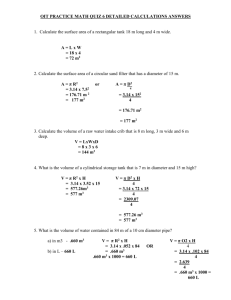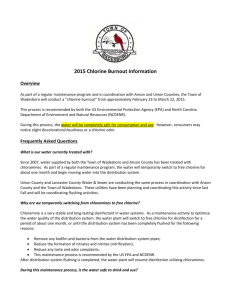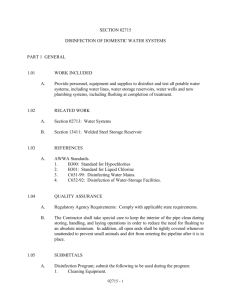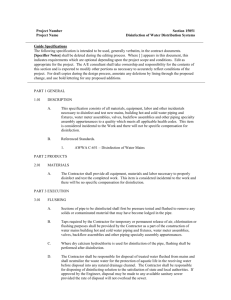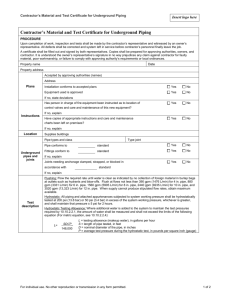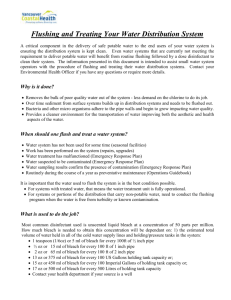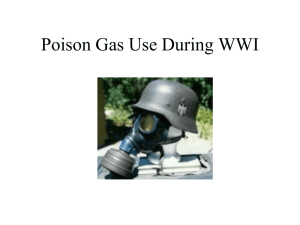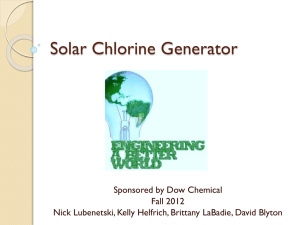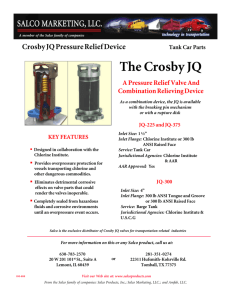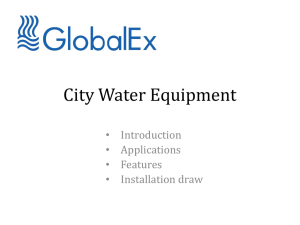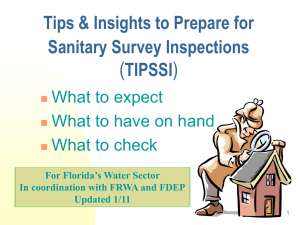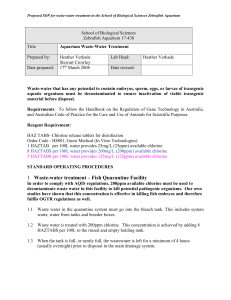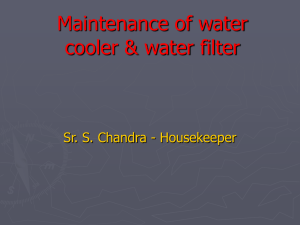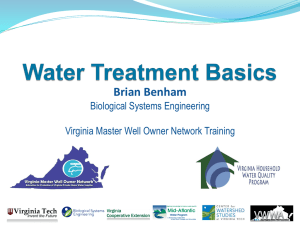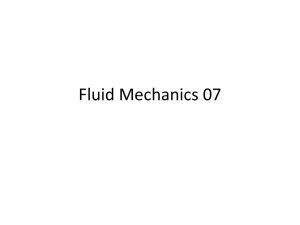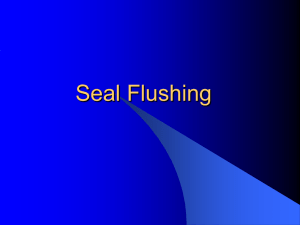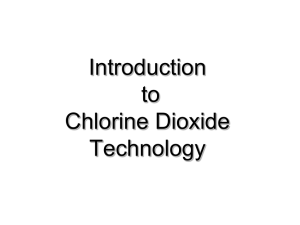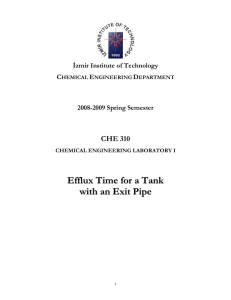Dealing With High Water Age in the Distribution System
advertisement
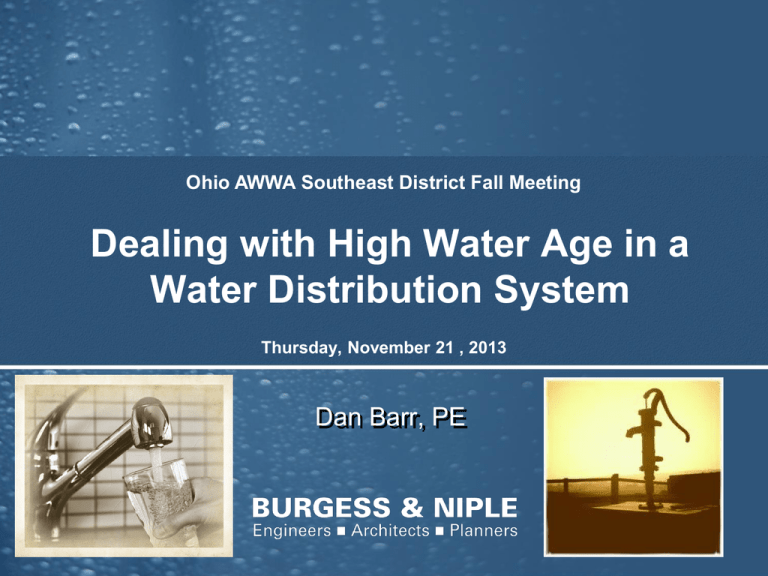
Ohio AWWA Southeast District Fall Meeting Dealing with High Water Age in a Water Distribution System Thursday, November 21 , 2013 Dan Barr, PE Introduction • • • • • What is water age? Why do we care about it? What causes it? What can we do about it? What can we do about it’s effects? What is Water Age? Defined as the time period that a particular unit of water is traveling in the distribution system before it leaves that system. What is Water Age? • Normally measured in hours or days through water quality computer modeling • Cannot be directly measured • Can be indirectly measured Why Do We Care About It? Surface Water • High Disinfection Byproducts • Low Chlorine Residuals Ground Water • Pipe Corrosion • Color • Low Chlorine Residuals Why Do We Care About It? What is too old? 11 10 9 12 1 2 3 8 4 7 6 5 Why Do Systems Have High Water Age? Fire protection requirements increase water age Pipe Volume (per mile) Pipe Diameter Gallons 2” 4” 862 3,466 6” 8” 10” 12” 18” 7,755 13,786 21,540 31,019 69,792 Larger pipes and storage for fires has a significant effect on water age especially for smaller systems or pressure zones Why Do Systems Have High Water Age? Customer Usage has dropped • Conservation • Population and businesses leaving • Seasonal variations Why Do Systems Have High Water Age? Sizing for future growth or customers What Can Be Done to Lower Water Age? • • • • • • • Proper storage sizing Increased tank turnover Rerouting flows Flushing Increase demands and pressure zone bleeders Reduce piping Eliminate dead ends What Can Be Done to Lower Water Age? A storage and pumping analysis should include: Distribution system capabilities during critical conditions Current and future storage/pumping requirements District by district requirements Incorporates minimum turnover requirements What Can Be Done to Lower Water Age? This analysis determines the minimum required storage volume for each of the following components: Operational (balancing and turnover) Fire Protection Outages The Three Components of Storage What Can Be Done to Lower Water Age? Rerouting Flows Involves closing valves to force water through high water age areas. Watch shifting water age problems to other places. Water models can help predict result What Can Be Done to Lower Water Age? Increased Storage Turnover • Simple pumping control changes • Pumps fill tank longer What Can Be Done to Lower Water Age? Tank mixing • Active versus passive • Helps reduce water temperature • Reduces dead zones in tank • Mixing old water • Chlorine residual monitors What Can Be Done to Lower Water Age? Flushing • Increased flow reduces water age. • How much water will need wasted? • Many situations require too much water to be wasted. What Can Be Done to Lower Water Age? Increase Demands • Add customers • Move pressure zone boundaries • Add bleeders What Can Be Done to Lower Water Age? Abandon or reduce piping • Valve off piping • Replace mains with smaller ones What Can Be Done to Lower Water Age? Eliminate Dead Ends by Looping • Adds capacity and fire protection • Expensive and easements required What Can Be Done to Lower Water Age? Computer models help by: • Checking results before changes made • Locate high water age areas without as much sampling. • Locate fresh water to help indentify solutions. What Can Be Done about its Effects? • • • • • Tank aeration or air stripping Chlorine boosting Flushing Corrosion inhibitors and water stabilization Water main rehabilitation or replacement What Can Be Done about its Effects? Tank aeration or air stripping • Can work well for certain THMs • Does not impact chlorine levels significantly • Simple designs • Watch venting What Can Be Done about its Effects? Chlorine Boosting • Remote low level sodium hypochlorite feed • NO-DES flushing What Can Be Done about its Effects? Chlorine Boosting and Flushing • Remote low level sodium hypochlorite feed • Chlorine tablets • NO-DES flushing • Flushing What Can Be Done about its Effects? Corrosion Control • Add inhibitors or increase dosage • Change treatment to stabilize water What Can Be Done about its Effects? Water Main Rehabilitation or Replacement • Material choices • Diameter reductions • Internal coatings Recent Current Events Summary Of The Reduction Of Lead In Drinking Water Act And Frequently Asked Questions by US EPA on October 22, 2013 5. Q. Are fire hydrants subject to the lead free requirements in section 1417(a)? A. Information available to EPA indicates that fire hydrants can be, and are, used in emergency situations to provide drinking water when there are disruptions to the normal operations of the drinking water distribution system. Therefore, as a class, hydrants would not qualify for the exclusion for pipes, fittings and fixtures used exclusively for nonpotable services Recent Current Events Jury Finds Pipe Maker Defrauded Governments A federal jury in California found on Thursday that the nation’s largest maker of plastic pipe defrauded states and municipalities over a decade by knowingly selling them defective pipe for use in their drinking water, firefighting, irrigation and other essential public systems. Recent Current Events • • • The jury’s decision entitles the states and municipalities to be compensated for their losses by the manufacturer, JM Eagle, a private company based in Los Angeles that has 20 plants in the United States and Mexico. The amounts are to be determined in the next phase of the proceedings, a second trial under the same judge but with a different jury. The case was brought under a law that calls for triple damages, plus additional penalties for each false claim submitted to a body of government. Conclusion and Summary Any Questions? Dan Barr Cell 614-633-5029 dan.barr@burgessniple.com www.linkedin.com/in/danbarratburgessandniple/ Water Distribution System Professionals LinkedIn Group
